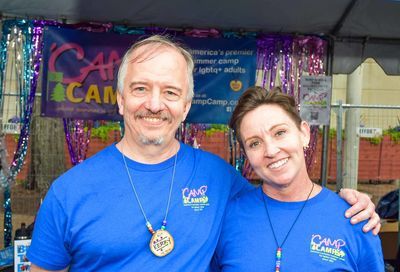Dictionary.com Adds Eight New LGBTQ Words
The latest revisions to Dictionary.com's entries also eliminated gender-specific terms from various definitions.

Dictionary.com, the online resource based on Random House Unabridged Dictionary, added eight LGBTQ terms to its latest official update, released earlier this month. It has also adopted gender-neutral language that is easier to use and more inclusive of LGBTQ identities.
It is common practice among dictionary publishers to add new words and update definitions as language evolves and as heretofore-nonexistent terms come into being to reflect updates in technology or the current cultural zeitgeist.
In this instance, the eight LGBTQ words — which were among 566 new additions — reflect greater awareness of the diversity in gender and sexual identities.
Among the new words are “diverse-owned,” an adjective, generally referring to a business, that refers to an entity owned by someone who belongs to a historically marginalized or underrepresented group (at least in entrepreneurship), such as women, ethnic or racial minorities, and LGBTQ people.
Another word is “gay marry,” a verb that has become culturally relevant in recent years and is generally used colloquially, referring to the act of marrying a person of one’s own gender.
The term “amalgagender” is an adjective relating to a person whose gender identity is related to, or impacted by, the fact that they are intersex.
Meanwhile, the adjective “stealth” refers to a transgender person who is “living as a cisgender member of one’s identified gender,” without revealing their transgender identity.
In romantic and sexual terminology, the adjective “polysexual” is used to describe a person who is sexually attracted to people of various genders, but not necessarily to people of all genders.
This is separate and distinct from the term “polyamorous,” as is the new term “polyromantic,” which describes a person romantically attracted to people of various genders, but not necessarily to people of all genders.
The new term “autosexual” is an adjective used to describe a person who primarily feels sexual attraction to and desire for themselves, as opposed to other people, while “autoromantic” refers to a person who primarily feels romantic attraction to and desire for themselves, as opposed to other people.
Dictionary.com also revised the existing definitions of more than 2,000 words since its last update, including 400 that were updated to replace or remove gender-specific pronouns, according to John Kelly, vice president of editorial at Dictionary.com.
Those changes include replacing the pronouns “him or her” and “he or she” with the gender-neutral “their” and “they,” respectively.
“This change was made for two reasons: inclusivity and usage,” Dictionary.com lexicographer K. E. Callaway told LGBTQ Nation. “On the inclusivity side, ‘his’ or ‘her’ does not include people who use other pronouns. In terms of usage, ‘they’ is simply much more common as a generic pronoun than ‘he’ or ‘she,’ including in spoken and all but the most formal types of written English. In fact, this has been the case for decades (even though people rarely notice it in speech).
“By making this change, we have made our entries more similar to how people actually speak and write, hopefully making the entries more natural-sounding — and thus more accessible to readers,” Callaway added.
Kelly told NBC News earlier this month that terms relating to gender and identity have significantly changed and evolved rapidly over the past 15 years, both in social and medical contexts, and the dictionary has been updated to include words that people may encounter as that new vocabulary becomes part of the cultural lexicon.
There is undoubtedly going to be backlash and resistance to using any gender-neutral terms or preferred pronouns to refer to transgender or nonbinary people, due to the current societal hostility against public expressions of gender-nonconformity. Conservatives, in particular, may feel that the influx of new words as part of a sinister “agenda” to push the idea that gender or sexuality can be fluid.
“Language really is a lightning rod,” Kelly told NBC News. “All of a sudden it can feel, when these new words get announced, that there’s an agenda behind it. I want to be clear: There isn’t an agenda; there is documentation [showing that language is changing and ever-evolving]. Whether we like it or not, whether we agree with it or not, whether it’s our personal views or not, it’s our job to be a service to people to capture that language as objectively as possible.”
Support Metro Weekly’s Journalism
These are challenging times for news organizations. And yet it’s crucial we stay active and provide vital resources and information to both our local readers and the world. So won’t you please take a moment and consider supporting Metro Weekly with a membership? For as little as $5 a month, you can help ensure Metro Weekly magazine and MetroWeekly.com remain free, viable resources as we provide the best, most diverse, culturally-resonant LGBTQ coverage in both the D.C. region and around the world. Memberships come with exclusive perks and discounts, your own personal digital delivery of each week’s magazine (and an archive), access to our Member's Lounge when it launches this fall, and exclusive members-only items like Metro Weekly Membership Mugs and Tote Bags! Check out all our membership levels here and please join us today!




























You must be logged in to post a comment.